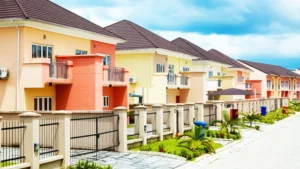
By David Akinmola
Thousands of prospective homeowners in Lagos are facing mounting frustration over long delays and shifting delivery timelines in several state-backed and private housing schemes across the metropolis, despite making upfront payments for properties that remain uncompleted or undelivered.
From the government’s ambitious “LagosHOMS” programme to numerous private real estate developments promising affordable housing in fast-growing suburbs, beneficiaries and subscribers say they are being forced to “pay now and wait indefinitely” in what they describe as a cycle of broken promises, inadequate communication, and questionable project timelines.
Many subscribers who invested in these housing schemes—some paying millions of naira upfront—say they have waited between two to five years without being handed the keys to their homes.
“I paid for a two-bedroom flat at Sangotedo under a private-public partnership scheme in 2021,” said Samuel Adebajo, a civil servant. “They promised delivery within 18 months. Now, it’s almost four years, and the building is still at lintel level. All we get are excuses.”
A joint investigation by The Guardian reveals that several estate projects, especially those in areas like Ibeju-Lekki, Sangotedo, Epe, and Alimosho, are caught in limbo due to a mix of poor project financing, inflation, rising cost of building materials, and weak regulatory oversight.
While the Lagos State Government has made strides in boosting housing supply—commissioning thousands of units under the Lagos State Development and Property Corporation (LSDPC) and LagosHOMS—many projects remain under construction long after subscribers have paid for homes.
Real estate analysts point to the economic headwinds, including sharp fluctuations in foreign exchange, rising cement and iron rod prices, and the high cost of labour, as contributing to the delays. However, subscribers argue that developers and agencies often fail to provide clear communication or viable alternatives.
“For months, we’ve been asking for an update on our property in Lekki Gardens Phase 4. The developer has not answered emails or calls. All we want is transparency,” said Ifeoma Chukwuma, who paid over ₦14 million in 2020.
A property lawyer, Barrister Lanre Obasa, warned that such cases may lead to rising litigations and trust issues in Nigeria’s property sector. “The law is clear: once payment is made under a contract with defined timelines, developers are expected to honour their end. Failure to do so amounts to breach of contract,” he explained.
He urged subscribers to include clearer penalty clauses in their agreements, as well as insist on escrow-based payment structures to reduce the risk of delay or fraud.
Meanwhile, some government officials, speaking on condition of anonymity, admitted that delays exist but blamed them on limited budget releases and contractor inefficiencies.
In a response, the Lagos State Ministry of Housing said efforts are underway to accelerate delivery timelines and ensure fairness for allottees. “We acknowledge delays in certain sites due to macroeconomic factors. However, we are working closely with contractors to meet revised deadlines,” a spokesperson said.
Despite these assurances, the sense of disappointment among subscribers persists. Many claim that they are forced to pay rent elsewhere while servicing housing loans on yet-to-be-completed homes.
“The emotional and financial strain is too much,” said Chioma Ikenna, who signed up for a cooperative housing scheme in Alimosho. “We were promised keys in December 2023. Now they’re telling us mid-2026. No compensation. Nothing.”
Housing rights advocates argue that this pattern undermines efforts to solve Nigeria’s housing deficit, especially in Lagos, where the gap is estimated at over 2.5 million units.
“With the average Lagos resident paying out-of-pocket for shelter and no strong consumer protection in the housing sector, this ‘pay now, wait later’ culture is creating a crisis of confidence,” said Titi Ajayi, Executive Director of Shelter Watch Nigeria.
As hope gives way to frustration for many subscribers, experts are calling for tighter regulation of housing schemes, stronger project supervision, and legal reforms to protect buyers from indefinite delays and broken contracts.
Until such changes are made, the dream of owning a home in Lagos, for many, will remain a long and uncertain wait—despite paying in full.







